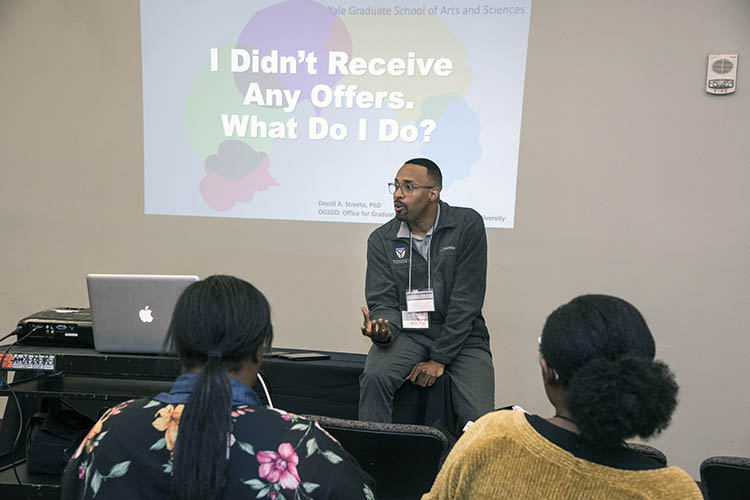Denzil Streete on ancestry, kinship, legacies and the way forward
Grad Division chief of staff and assistant dean for diversity shares his reflections on Black History Month
February 23, 2021

“My presence doing this work of diversifying graduate education has its genesis in the trauma I myself experienced being a Black man at an Ivy league institution,” Denzil Streete, Graduate Division chief of staff and assistant dean for diversity, wrote in an On My Mind column. (Photo via Denzil Streete)
One of the sweaters in my closet screams the phrase, “I’m ‘bout making my ancestors proud.” As I think about the work I get to do with the phenomenal students, staff and faculty on a daily basis, central on my mind are the ways in which I show up in different spaces and places, and how that presence either reaffirms the status quo or challenges us all to be better versions of ourselves.
‘On My Mind’
‘On My Mind’ is a space for senior campus leaders to communicate with the Berkeley community. Read more here.
As an immigrant to this country, whether I like it or not I’m judged by the remnants of an accent that is as much a part of my identity as the strands of DNA of which I am made. In light of the twin pandemics of racial injustice and the coronavirus, we are forced, like never before, to confront our mortalities on a daily basis, as friends and loved ones seem to be departing in untimely ways, and with travel and assembly restrictions making it harder to grieve and lean on each other.
As I inhabit this space, I’m reflecting on how my foreparents, without even a high school diploma, would view the opportunities I’ve been provided on the backs of their hard work. I am, because they first were. Am I making use of my presence to honor their presents? What elements of their identities and traits persist in me? Are they proud of the ways in which I challenge the staff on a daily basis to think of new ways to reach the students we serve?

My aunt Marcia Bennett, left, and my mom Sandra Streete, right, both paved the way for my success in academic spaces and life. (Photo via Denzil Streete)
Indeed, my presence doing this work of diversifying graduate education has its genesis in the trauma I myself experienced being a Black man at an Ivy league institution pursuing a Ph.D. Who was I to think that such an institution had the capacity to acknowledge and value my presence? My persistence was largely made possible through the many academic sisters and brothers I toiled with on the journey. For many of us, all we had was each other. To this day, I am constantly interrogating how we invite new and minoritized “family” members to the academy. In way too many cases, we show up as performative “foster” parents, making a ‘contribution’ for all the wrong reasons and leaving a trail of trauma and pain in our wake.
So, during this Black History Month, as I engage in conversations (in and out of Zoom rooms) and go about doing the work of (re)building spaces where students are not just seen and heard, but are also affirmed, I just can’t stop thinking about my legacy. You see, in a world in which it is very clear that certain bodies just can’t assume that their presence is guaranteed, the work I do today may just be my last opportunity to do work that impacts. Work that becomes my legacy. Work that makes a future generation of Black academics look back and whisper, “I hope I’m making my ancestors proud!”